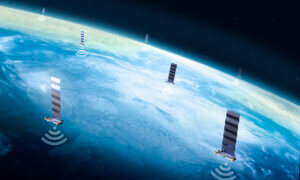Just this month, China has managed to successfully launch into orbit a Long March 6 rocket alongside 13 satellites. The payload was the 351st rocket in the Chinese Long March series and included a brand new 6G operational satellite.
The launch happened on November 6 at the Taiyuan Satellite Launch Center in the Shanxi Province with one of the satellites, the Tianyan-5, having been described by the BBC as the first 6G satellite.
The spacecraft was a joint project between Chengdu Guoxing Aerospace Technology, the University of Electronic Science and Technology of China, and Beijing Weina Xingkong Technology. Aside from Earth observations, the satellite will also test a high-frequency terahertz communication payload that, according to Chinese engineers, could dramatically boost data speeds.
Terahertz waves (THz) happen to have a significant flaw. Known as terahertz radiation or tremendously high frequency, terahertz waves (THz) are submillimeter waves situated between infrared radiation and microwave radiation on the electromagnetic spectrum. In most common cases, they are used to achieve data rates greater than 100 Gbps.
Unfortunately, it was proven that the water vapor in Earth’s atmosphere is a strong absorber of terahertz radiation, limiting the range of THz applications and hindering the widespread development of 5G, and implicitly 6G if the network will use the same technology.
The industry still has a long way to go before agreeing on what exactly 6G would imply. 5G is considered the 5th and most recent generation of cellular broadband networks. The Tianyan-5 satellite was launched among several commercial remote sensing satellites developed by Satellogic, an Argentinian company specialized in Earth-observation satellites.
The outline of these cellular generations is defined by a global partnership known as the 3rd Generation Partnership Project (3GPP) comprised of 7 telecommunication standard development organizations, and which has not yet determined the specifications of 6G.
Popular Mechanics, a monthly American magazine that also publishes articles on new advancements in technology and science, noted that several astronomers have threatened to sue The Federal Communications Commission (FCC) and Space Exploration Technologies Corp (SpaceX). The reason is project Starlink, a satellite internet constellation which began in 2015 to provide satellite Internet access.
Concerns were raised about the constellation of communication satellites for supposedly jeopardizing the viewing conditions of ground-based astronomy observations, which rely on a darkened sky to make observations about the universe.
Not only that, but a sea of communication satellites orbiting the planet has the potential to blind observatories looking at certain wavelengths of light and make satellite-on-satellite collisions more likely.
“Understanding the risk for the astronomical community, a set of actions are proposed in this paper to mitigate and contain the most dangerous effects arising from such changes in the population of small satellites,” the astronomers wrote on January 29 in a 16-page letter, titled “Concerns about ground-based astronomical observations: A step to Safeguard the Astronomical Sky”
According to the report, in a sun-synchronous orbit, the satellites will provide high-resolution images covering 4 square kilometers a day with high enough resolution to discern individual trees in a forest.
The satellites will be used to monitor crop disasters, water conservation, and mountain floods, for forest fire-prevention and forest inspection as well as for obtaining extensive satellite imagery and data. The spacecraft could also be used to help stop illegal-logging in forests but only time will tell if this will be the next step in G for cell phones.
Follow TechTheLead on Google News to get the news first.

























